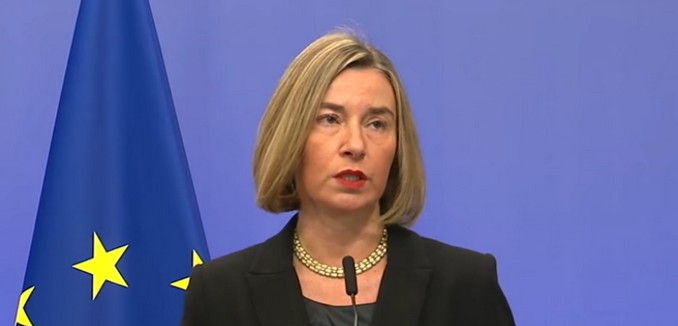The invitation extended by the European Union’s foreign policy chief, Federica Mogherini, to Iranian Foreign Minister Mohammad Javad Zarif to discuss the status of the nuclear deal next week is one more example of her penchant for engaging the world’s worst tyrants instead of pressuring them to change, Eli Lake, a columnist for Bloomberg View wrote Tuesday.
Rather than getting tough with dictators, Lake observed, Mogherini has an inclination to engage with them with the goal of the “preservation of the status quo.” Maintaining the status quo is a good idea “in moments of tranquility and prosperity, but not when authoritarians are on the march in Europe and Asia,” Lake continued.
Last week in Cuba, Mogherini had little or nothing to say about the the suffering of the political prisoners and their families there. Rather than lecturing Cuba to be more free, she implicitly chided the United States for “trying to isolate Cuba,” while reassuring the repressive government that “we Europeans” are ” closer to you than ever.” Cuba’s minister for economic development is slated to visit Brussels next month as part of an effort to island nation closer to the EU.
Similarly, when the U.S. urged other nations to close their embassies in North Korea after a series of missile and nuclear tests this past fall, Mogherini instead urged the European Parliament to open “credible diplomatic channels to the rogue government.
When in 2014, Toomas Hendrik Ilves, the former president of Estonia, urged stronger actions against Russia for annexing Crimea from Ukrained, Mogherini dismissed his concerns by asking rhetorically “So let’s bomb Russia? What is the solution then?”
With regard to Iran, the EU could be in a position to take action against the regime for brutally repressing the protests over the past two weeks. Suzanne Maloney of the Brookings Institution said that “this is the European moment on Iran.” Maloney argued that just as Europe took a stand against Iran when it put down protests over what is widely believed to have been a stolen election in 2009, Europe should do the same now and say, “We are not going to sustain political and economic engagement with a country engaged in the suppression of peaceful protests.”
But it doesn’t appear that Mogherini will deviate from her instinct to appease tyrants in Iran. She was silent for nearly a week at the beginning of the protests. But when Mogherini finally did say something it was, “In the spirit of openness and respect that is at the root of our relationship,” she said. Mogherini went on, “we expect all concerned to refrain from violence and to guarantee freedom of expression.” Even the violence was mostly being employed by the regime against the protesters, the EU foreign policy chief treated both sides equally.
“It’s as if Mogherini believes that Iranian demonstrators are arresting and silencing members of the state Basij militia, and not the other way around,” Lake observed. “And why does she speak of openness and respect? Has the European foreign policy chief not followed the ordeal of European dual national citizens, detained on trumped-up charges in Iran? Apparently this openness and respect is a one-way street.”
Mogherini, Lake wrote, appears to have deviated from the usual approach of previous high representatives of foreign policy for the EU, who “at least tried to introduce Western values into European foreign policy. Instead Mogherini “doesn’t want to offend the envoys of tyrants.” Instead, “she seeks to build partnerships with them for the cause of peace.” The word Lake uses to describe her approach to the worst human rights abusers around is “appeasement.”
[Photo: ProductiehuisEU / YouTube]




